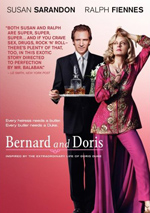|
HBO
|

| |
|
MOVIE INFO
|
|
Director:
Bob Balaban
Cast:
Ralph Fiennes, Susan Sarandon, Peter Asher, Vincent Bagnall, Monique Curnen, Haig Dick, James Rebhorn, Nick Rolfe
Writing Credits:
Hugh Costello
Synopsis:
Inspired by the true story of tobacco billionairess Doris Duke and her devoted Irish butler Bernard Lafferty, the touching HBO Films drama Bernard and Doris stars Oscar® winner Susan Sarandon (Dead Man Walking) and Ralph Fiennes (The English Patient). After failed relationships with her previous waitstaff, Doris meets Lafferty, fresh out of rehab and without a penny to his name. She takes him on as her butler and he is put in the unenviable position of having to convince the notoriously demanding Duke to keep him in her employ. Directed by Bob Balaban (Gosford Park), the film effectively captures the elegance of a bygone era and is scored with countless musical standards, such as Peggy Lee's "The Best Is Yet To Come". Bernard and Doris tells the witty and endearing tale of an unconventional bond between a society "princess" and her flawed "pauper" of a butler.
MPAA:
Rated NR
| |
|
DVD DETAILS
|
Presentation:
Widescreen 1.78:1/16X9
Audio:
English Dolby Digital 5.1
Spanish Dolby Surround 2.0
Subtitles:
English
Spanish
French
Closed-captioned
Supplements Subtitles:
None
Runtime: 103 min.
Price: $26.98
Release Date: 4/29/08
Bonus:
• Audio Commentary with Director Bob Balaban
• “Growing Up Rich: The Real Doris Duke” Featurette
• Previews
| |
|
PURCHASE @ AMAZON.COM
|

| |
|
EQUIPMENT
|
Panasonic 50" TH-50PZ77U 1080p Plasma Monitor; Harman/Kardon DPR 2005 7.1 Channel Receiver; Toshiba A-30 HD-DVD/1080p Upconverting DVD Player using HDMI outputs; Michael Green Revolution Cinema 6i Speakers (all five); Kenwood 1050SW 150-watt Subwoofer.
| |
|
RELATED REVIEWS
|

| |
[an error occurred while processing this directive]
|
Bernard And Doris (2007)
|
|
Reviewed by Colin Jacobson (April 11, 2008)
I’m not sure when HBO became a source of made-for-cable movies with serious star power, but they’ve created a real niche for themselves in that regard. Indeed, their efforts have largely eliminated the stigma attached to cable productions. For the latest in a long line of well-received HBO productions, we go to 2008’s Bernard and Doris.
Based loosely on real events, this flick tells the tale of billionaire heiress Doris Duke (Susan Sarandon). A prologue refers to her lifelong existence as “the world’s richest girl” before we meet her in the 1980s. A prickly employer, she fires one butler and takes on a new one: Bernard Lafferty (Ralph Fiennes). Duke tests the quiet Irishman, but he proves up to the task and becomes a trusted servant. The film follows their relationship over the years as they become close.
Bernard presents such a limited scope that it could easily be adapted for a stage play. Nearly all the “action” takes place in Doris’s mansion. On the rare occasions when the film leaves that location, it usually plops us with Doris and Bernard in a car on local roads; the major – though exceedingly brief – exception occurs when Bernard visits Doris in the hospital.
The heavy concentration on one location could seem oppressive and dull. However, in this case, the choice works because it allows us to focus on the characters. The film doesn’t want to overwhelm us with the grandeur of Doris’s jet setting and celebrity friends; that would defeat the purpose. Instead, it wants to concentrate solely on the relationship between Doris and Bernard, so the lack of location changes works very well and seems eminently sensible. For all I know, the filmmakers may have wanted to go out of the mansion but couldn’t afford it, but if that’s the case, I’m glad they couldn’t spring for other spots.
Bernard also comes with literally no plot at all. This is a true character drama, as it gives us aspects of the Bernard/Doris relationship and almost nothing else. We barely even see significant events in their lives, as the movie focuses on the quiet aspects of their interactions. Doris’s stroke and Bernard’s time in rehab create the flick’s major “plot points”, but even those receive subdued treatment and don’t become events unto themselves. This is a film that heavily embraces its characters to the exclusion of all else, and that choice succeeds.
Of course, it helps that it boasts two exceedingly talented actors as its leads. I don’t think a moment of Bernard passes without either Fiennes or Sarandon onscreen, and we usually get both of them together. Sarandon gets the juicier role as the wealthy heiress, but she avoids the standard broad flourishes. Though Sarandon easily could’ve turned Doris into a simple “spoiled rich bitch” caricature, she creates a true three-dimensional portrait of the woman. Sure, she demonstrates Doris’s wary cynicism and the general sense of entitlement that comes with a lifetime of absurd wealth, but she also displays a more vulnerable and personable side. Sarandon provides a steely performance with real depth and understated warmth.
It’s strange to see Fiennes in such an obsequious role. Heck, he first came to prominence as a sadistic Nazi in Schindler’s List and he usually takes on more dynamic, willful parts. Bernard is clearly the less interesting of the lead parts because he’s such an anonymous personality for much of the movie. Fiennes allows the character to grow and evolve over the film and does so in a natural manner. The Bernard we see at the end clearly has changed from the man we met 100 minutes earlier, but Fiennes doesn’t telegraph these elements. Instead, he allows them to occur in a quiet, organic manner that fits the tale.
Bob Balaban’s understated direction completes the flick’s series of strong choices. On many occasions, Bernard could easily veer into soap opera territory. We see Bernard’s alcoholism and Doris’s health problems, but Balaban doesn’t treat these in a tear-jerking way. Like everything else, they come across in a subdued and emotional manner but not one that feels manipulative or forced.
All of these decisions turn Bernard and Doris into an engaging character piece. This flick won’t work for those with an appetite for action, as little ever really seems to happen here. However, if you want to watch an absorbing tale of two interconnected personalities, you’ll find a lot to like here.
|
The DVD Grades: Picture C/ Audio C/ Bonus C+
|
|
Bernard and Doris appears in an aspect ratio of approximately 1.78:1 on this single-sided, double-layered DVD; the image has been enhanced for 16X9 televisions. For reasons unknown, these HBO movies never seem to look very good on DVD, and Bernard was another mediocre transfer.
Sharpness was up and down, though the movie usually offered good delineation. Softness interfered with moderate frequency, as occasional shots appeared less than well-defined. Still, much of the time, matters were reasonably concise and accurate. No issues with jagged edges or moiré effects occurred, but moderate edge enhancement showed up through the film. The flick tended to be somewhat blocky and gauzy. Though no actual source flaws appeared, grain could become a distraction.
Colors varied as well. Some exteriors demonstrated nice vivacity, but most shots seemed a bit flat. The colors were acceptable but rarely better than that. Blacks were reasonably dense and firm, while shadows were inconsistent. In general, low-light shots came across as somewhat thick and lackluster. This was a watchable transfer but not one that excelled.
Similar thoughts greeted the Dolby Digital 5.1 soundtrack of Bernard and Doris. The soundfield failed to deliver a lot of pizzazz. Most of the information focused on the front channels, where music offered decent stereo imaging and general ambience. A few scenes such as a thunderstorm opened up the spectrum and used the surrounds to minor effect. Otherwise, this was a restrained soundfield.
Audio quality was satisfying. Speech always came across as concise and distinctive, and I noticed no edginess or other issues. Music seemed clear and vibrant, as the score and songs were reproduced with good vivacity. Effects played a minor role but were clean and accurate. One distraction came from a light clicking in the front left speaker during a few parts of the movie. This was an unexceptional track.
When we head to the extras, we start with an audio commentary from director Bob Balaban. He offers a running, screen-specific discussion that looks at how he came onto the project, casting and performances, locations and sets, the story and its loose connection to the facts, costumes and production design, dealing with budgetary restrictions, and a few other tidbits.
On the DVD’s case, it promises a “revealing” commentary. I don’t think Balaban’s chat lives up to such semi-juicy billing, especially since it tends toward “nuts and bolts” filmmaking topics like sets and production elements. Nonetheless, Balaban provides a reasonably informative take on the flick. Dead air increases as the movie progresses, but Balaban still gives us a good overview of the different subjects and makes this a fairly enjoyable discussion.
Growing Up Rich: The Real Doris Duke runs nine minutes, 44 seconds and comes with comments from Balaban. We see movie clips and archival elements as Balaban relates some facts about Duke. His notes help fill in the reality behind Bernard.
A few ads open the DVD. We get clips for The Bucket List and HBO Films.
Bernard and Doris provides an abnormally subdued and understated character drama. It resists all urges to overplay its story and participants, as it instead takes a delightfully real and low-key approach to matters. The DVD offers mediocre picture and audio as well as a couple of interesting supplements. Give this one a look as a rental.
|
|
Viewer Film Ratings: 4.2857 Stars | Number of Votes: 14 |
|
|

